They’re designed to boost your energy levels, but does drinking energy drinks really benefit you beyond the initial surge of energy?
Contents
Introduction

Energy drinks can be a great way to avoid your usual afternoon slump, as they help you to power through whatever it is you need to do by enhancing your energy levels.
From being the ultimate convenient caffeinated pick-me-up to nourishing you with additional supplements and even aiding weight loss, drinking energy drinks has a number of benefits.
This article will walk you through the pros and cons of energy drinks as well as cover some of the most common ingredients used, and whether or not there are any natural alternatives to drinking energy drinks when you feel like you need an energy boost.
Why Drink Energy Drinks?
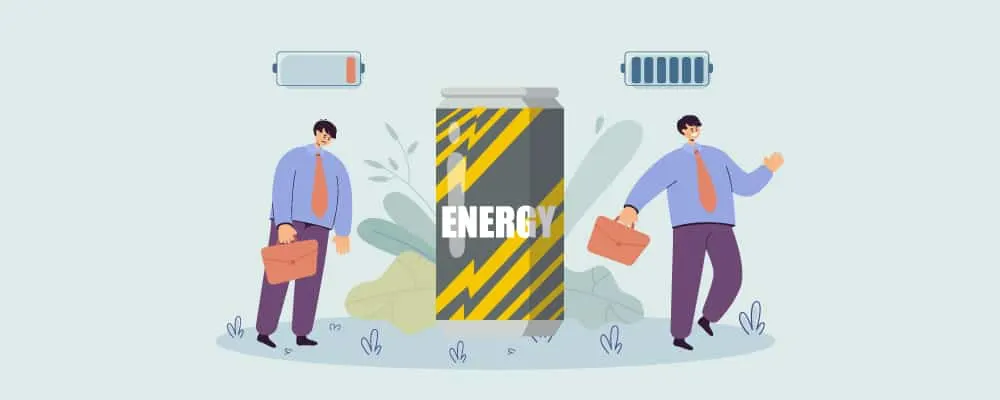
Before we get into both the benefits and the drawbacks of energy drinks, first we must take a look at why people drink energy drinks in the first place.
More Energy
Most people turn to energy drinks to give themselves an extra energy boost, either to see them through a long day or as a pick-me-up at the end of one.
There are a number of ingredients in energy drinks that provide a natural surge of energy, hence how their namesake came to be, as well as containing some not-so-natural, artificial chemicals that are added specifically to reduce feelings of fatigue and to increase focus.
Standardized Caffeine Content
Caffeine is a great and wonderful thing. For many people (guilty!) it’s practically running through our veins. All jokes aside, caffeine can have negative effects if consumed in too large quantities or if you’re sensitive to it, so it’s worth keeping track of your caffeine intake.
You should avoid consuming over 400 mg of caffeine, as this is considered the maximum amount that is safe for adults. However, everybody’s tolerance is different, and where some people will push this to the limit, 400 mg may be enough to send your heart into overdrive.
Energy drinks provide a standardized amount of caffeine which makes it easier to stay within the recommended limit for those who are trying to manage their caffeine consumption.
Taste
Not everybody is going to like tea and coffee. If you’re one of the many people who find either of these beverages to be too bitter or too weak, energy drinks hit the sweet spot of being tasty yet caffeinated enough to make a noticeable difference in your energy levels.
These are just a few of the key reasons behind the booming energy drinks industry, but there are even more benefits associated with drinking energy drinks, which we’re about to go into!
Can energy drinks kill you?
Even though it doesn’t happen often, people have died from drinking too many energy drinks. Caffeine levels in energy drinks are sometimes substantially higher than those found in coffee or even certain pharmaceuticals. Hence, ingestion of lethal amounts of caffeine is possible.
Be aware that consuming an excessive amount of energy drinks may cause serious health issues, even death. As a result, it’s essential to note your limits and take energy drinks sparingly.
How do energy drinks affect your body within 24 hours?
Energy drinks include caffeine, which takes around 10 minutes to reach your bloodstream after consumption. Your pulse and blood pressure begin to quicken. Your blood caffeine concentration will be at its highest at this time.
Caffeine and sugar included in energy drinks may help get you going for a little while. It’s not the caffeine itself in energy drinks that you have to worry about, but rather everything else that happens to your body. Drink energy drinks sparingly because the short-term benefits don’t come close to outweighing the long-term health problems.
The Benefits of Drinking Energy Drinks
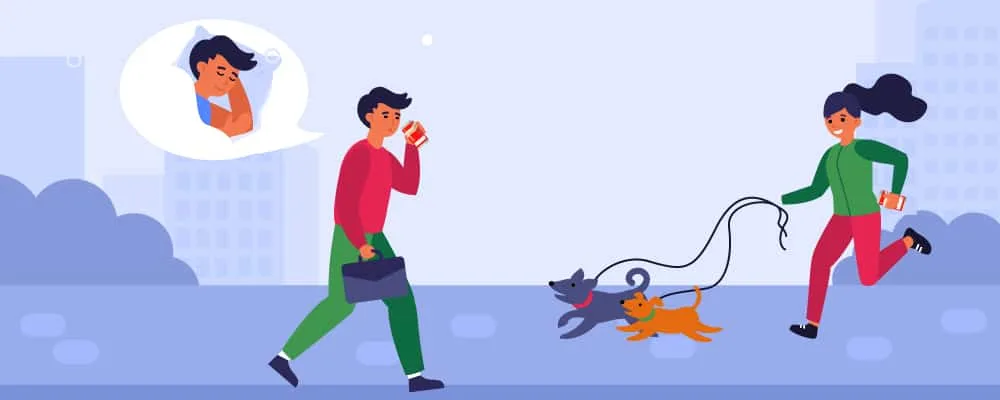
The U.S. energy drinks industry is worth billions of dollars, and its market value is predicted to increase even more over the years. Many people predict that by 2026, energy drink sales will reach a predicted value of $86.01 billion, so they must be doing something right.
There’s a reason that this industry is booming, thus it’s only logical to assume that some people really do benefit from drinking energy drinks. Still not convinced?
Here are some of the key ways in which taking a sip of your favorite energy drink can be beneficial to you.
Improves Concentration and Memory
Energy drinks contain caffeine, and caffeine helps improve concentration levels as well as improving your ability to recall information from memory, so you will be more mentally alert after drinking an energy drink which is one of the main reasons people choose to drink them.
Studies have shown that as little as one 500 ml can of Red Bull can improve levels of concentration and memory function by approximately 24%. It’s no wonder then that students with final exams and business people who work long hours choose to turn to energy drinks!
Faster Post Workout Recovery
For any gym bunnies out there, you may be interested to learn that drinking energy drinks can actually speed up your post-workout recovery after your last training session.
The stimulants that are often used in energy drinks deliver a rush of energy, and taurine is an amino acid that some energy drinks contain which boosts performance. It does this by promoting muscular contraction and aiding the removal of waste products from the body.
Caffeine and sugar are not a replacement for the electrolytes that sports drinks provide, however, and energy drinks are therefore slightly less beneficial for muscle tissue repair.
With that said, most energy drinks contain sodium which helps to replenish the electrolytes you used up during your workout. The carbohydrates-based drink will then be converted into more energy, which helps you recharge while your muscles start to repair themselves.
Reduce Fatigue
Energy-boosting equals fatigue-reducing, right? Well, actually, this isn’t always the case.
One of the great benefits of drinking energy drinks is that they can reduce fatigue temporarily, although you should pay attention to the emphasis here. With that said, however, an energy drink will certainly do the trick and see you through when you’re feeling fatigued. According to David Schardt, “if you’re driving, it might even save your life.”
Energy drinks are able to counteract some of the most common symptoms of fatigue by making you feel more awake and alert, but it’s important to remember that they are not a long-term solution to long-standing fatigue or issues with feeling exhausted all of the time.
If you have concerns about how fatigued you’re feeling, speak to your doctor or a medical professional and seek advice.
Improved Reaction Time
In the same way that energy drinks can improve concentration and focus, they can also significantly increase your reaction time.
A higher glucose content increases the acetylcholine level, which is the chemical that is responsible for muscle movement and so therefore the more you have, the faster your reaction time. Energy drinks with higher protein content also improve reaction speeds.
This is supported by Dr. Keith Pearson, who acknowledges multiple studies in his article about whether energy drinks are good for you which all “confirm that energy drinks can indeed improve measures of brain function like memory, concentration, and reaction time”.
Can Help With Weight Loss
Have you ever thought you were going to sprout wings and fly away after drinking an energy drink?
Some people view the claim that energy drinks can aid weight loss is as far-fetched as the above statement, but studies have shown that the caffeine in energy drinks can boost your metabolism slightly, helping you burn up to an additional 100 calories per day.
The exact effect on your metabolism will depend on the quantity that you consume, but don’t forget that drinking excessive amounts of energy drinks can cause serious health problems.
You should also check the ingredients for the energy drink that you’re using, as some brands and different flavors will have a higher sugar content than others which can undo all of the hard work you’re trying to do, or potentially even make you gain weight in the long-run.
Improved Physical Endurance
Caffeine has long been acknowledged as a stimulant that can positively affect endurance and performance, or at least when consumed in the right quantities. Drinking energy drinks can therefore also help improve endurance, as they too often contain high doses of caffeine.
The improvement to physical endurance is more noticeable amongst professional athletes compared to amateurs, but despite the physical edge that drinking energy drinks can bring to your athletic performance, they can also have consequences if consumed in high quantities.
Fast Caffeine Delivery
Haven’t you ever made a cup of coffee only to have to wait half an hour before it’s reached a drinkable temperature? Energy drinks eliminate this obstacle as they’re served cold, and they’re able to deliver caffeine to the bloodstream faster due to their quick consumption.
This means that you’ll be able to enjoy the benefits of drinking an energy drink much sooner than usual, and if you’re on the brink of falling asleep, swigging back a sip of an energy drink will make you feel more alert much faster than some other methods of caffeine delivery.
A Variety of Flavors
As we mentioned earlier, not everyone is guaranteed to like the taste of tea and coffee, especially if you’re not one to load up on syrups and sprinkles. But does that mean that you have to miss out on the benefits of a beverage with a high caffeine content? No!
Energy drinks have the added benefit of being made in a huge variety of flavors, so there’s something for everyone to enjoy. This means that energy drinks have a wider appeal that caters to all tastes, and likely play a large role in the impressive sales figures that we looked at earlier.
Additional Supplements
In addition to boasting a high caffeine content, other supplements are often added to energy drinks to further benefit the consumer. The ingredients that you’ll most commonly find in these drinks are taurine, B vitamins, and ginseng, plus more that we’ll go into later.
Each of these ingredients is thought to augment the benefits of drinking energy drinks, but as of yet, there is little evidence to support this. Instead, the additional supplements you consume through energy drinks are more likely to have an effect on your long-term energy.
Refreshing
We’ve already mentioned that energy drinks are best served cold, which combined with their tasty flavors make for a nice refreshing beverage. This means that in the warmer months, energy drinks are the more appealing caffeine source when compared to hot beverages.
Convenient
Unlike other sources of caffeine, energy drinks require no preparation, heating, or brewing, so they’re a great option if you need an extra boost of energy when you’re on the go. Plus, they’re widely available at most stores and gas stations, so it’s easy to pick up a can.
Affordable
You’ve probably heard the rhetoric about how “millennials can’t afford to buy a house because they spend all their money on avocado toast and expensive takeaway coffee,” but when you add up the total cost of all those coffees… well. We’re saying nothing.
Energy drinks are a much more affordable alternative when it comes to caffeinated drinks, costing up to $4 less on average or more if there’s a good deal or special promotion running.
Cons of Energy Drinks

We’d love to be able to tell you that drinking energy drinks won’t ever have any adverse effects, but as with everything in life, you can have too much of a good thing, and there are a few ‘cons’ that we have to explain with the ‘pros’ of drinking energy drinks.
Could Cause Heart Palpitations
As you know by now, energy drinks contain caffeine, and caffeine is a stimulant. It affects the central nervous system in order to make you feel more alert, but when taken too far, it can also make you feel dehydrated as well as raising your heart rate and blood pressure.
This usually doesn’t happen unless you consume more than the recommended 400 mg of caffeine or you’re particularly sensitive to the effects of caffeine, but if it does it can be an unpleasant experience. It’s worth noting that the majority of energy drinks contain between 70 and 200 mg of caffeine per can.
Other signs that you’ve had too many energy drinks and, therefore, too much caffeine for the day include:
- Heightened nerves or anxiety
- Irritability
- The jitters
- Headaches
- Nausea
- Insomnia or difficulty sleeping
- Increased blood pressure
- Sensitive bowels
Mixing energy drinks with alcohol is also a recipe for heart palpitations, with the results of one study showing that the participants involved were six times more likely to experience heart palpitations when they mixed their alcohol with an energy drink than when they drank alcohol on its own.
This is just one example of why you shouldn’t mix energy drinks with alcohol, which brings us neatly onto the next point…
Never Mix Energy Drinks and Alcohol
If you’ve never tried a jager bomb before, you might not understand the lure of using an energy drink as a mixer in the first place, but unfortunately, it’s become a popular trend amongst college students and young adults all over the globe.
We say unfortunately because mixing energy drinks with alcohol has potentially much bigger consequences than just waking up with a sore head the morning after a heavy night out.
At the risk of sounding like a broken record, caffeine is a stimulant, and this means that it can cancel out the depressive effect of alcohol. You might feel like you’re less intoxicated after knocking back a few mixed drinks, but you’ll still be just as under the influence.
The dangers of not being able to differentiate the full extent of your own alcohol-related impairments are pretty self-explanatory, as you could end up getting into all sorts of potentially harmful situations or even end up injuring yourself.
Although these risks are known to us know, the adverse effects of mixing energy drinks and alcohol weren’t always obvious and it wasn’t until 2010 that the US Food and Drug Administration (FDA) banned the manufacture and sale of pre-mixed alcoholic beverages that contain stimulants, which were hugely popular in the early-mid 2000s.
Despite not being able to buy them already mixed anymore, far too many people continue to combine energy drinks and alcohol to fuel their nights out, but we’re in agreement with the CDC here, and we would highly recommend against doing this.
Try to Avoid Varieties Loaded With Sugar
Next to caffeine on the list of things that are best consumed in small quantities is sugar, yet this is another ingredient that energy drinks tend to contain quite a lot of, although it tends to vary between brands and the different flavors.
Let’s take a look at two popular brands of energy drink to see how their sugar content compares.
One 8.4-ounce can of Red Bull, for example, will see you use up 27 grams of your recommended daily intake, which is about 7 teaspoons of sugar. Compare this to a 16-ounce can of Monster and you’ll see that the latter contains approximately double that amount with 54 grams of sugar, which equates to 14 teaspoons. That’s a lot of sugar in one small drink.
Consuming large quantities of sugar in a short space of time will cause a spike in blood pressure which means it’s especially important for people with diabetes or any form of blood sugar regulation issues to keep track of how many energy drinks they’ve drunk in a day.
Even without any underlying health conditions, you should still be careful with your sugar intake as eating a diet with too much sugar can lead to increased levels of oxidative stress and inflammation, as well as an increased risk of developing diabetes.
Fortunately these days, there are plenty of sugar-free alternatives that should help you keep your sugar consumption down whilst still being able to get your energy drink fix.
Energy Drinks Should Always Be Drunk in Moderation
Caffeinated products call for moderation due to the potential harm that can be caused as a result of consuming too much caffeine which we discussed earlier in this article. Sugar content is also a concern, and should also be monitored so as not to exceed your allowance.
Most of the negative effects associated with energy drinks are rare unless you exceed the recommended allowances, but doing so could see you overdose. In the worst-case scenario, this could be life-threatening, or it could cause difficulty breathing, chest pain, or convulsions.
We’ll just take a moment to remind you once more that the maximum daily recommended caffeine limit for an adult is no more than 400 mg, and for sugar, the maximum limit is 30 g.
You can check the energy drink’s caffeine content or use a caffeine calculator online to work out how many cans you can consume without exceeding the recommended maximum limit.
Common Energy Drink Ingredients
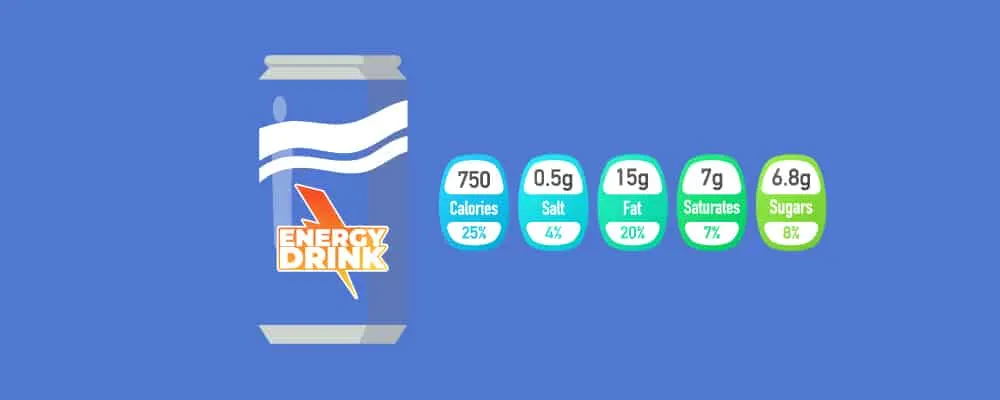
Energy drinks are not regulated by the United States Food and Drug Administration (FDA), so there is less restriction over what energy drink companies are filling their products with.
These days, brands will introduce a new ingredient into the mixture claiming it has the benefit of X, Y, and Z, but it’s sometimes hard to know which ingredients are actually going to do anything or if their only advantage is that their name is slapped on the ingredient list.
The following is a list of some common ingredients found in energy drinks, and if they have any benefits to the consumer.
Caffeine
Obviously, caffeine is a key ingredient in energy drinks. It’s not like we’ve mentioned it enough times. Not only that, but it’s one of the most commonly used drugs in the world and can be traced back throughout history, preceding us all.
Whilst it is naturally found in beverages like tea and coffee, caffeine is added to energy drinks and will usually total between 70 and 300 mg in total, although some are even stronger.
We needn’t really say more on caffeine as we’ve covered most of it already, but here are some of the caffeine contents found in other caffeinated products for reference:
- 110 to 150 mg – 8 oz of drip coffee
- 40 to 80 mg – instant coffee
- 65 to 125 mg – a cup of percolated coffee
- 41 mg – a can of Dr. Pepper
- 34 mg – a can of Coke
Ginseng
Ginseng is a herb that has long been used for medicinal purposes, and unlike some of the other ingredients we’ve looked at so far, it’s totally different from anything the human body naturally produces.
Many people believe that it has anti-fatigue properties and that it can improve your energy levels, as well as relieving stress. It’s also thought to stimulate the hypothalamic and pituitary glands which produce a hormone some may be sensitive to, potentially causing diarrhea.
B Vitamins
There are plenty of natural sources of B vitamins as they are found in a lot of common foods, although vegetarian and vegan diets may not provide an adequate amount unless careful. They’re also one of the most popular choices of oral vitamin or energy supplements.
B vitamins are great for converting stored food into energy, but whether or not that actually helps you to feel more energized after drinking an energy drink is still yet to be determined. Plus, the small traces used in energy drinks is unlikely to have a huge effect.
Sugar
Another ingredient we’ve already looked at is sugar, which can be converted into glucose to provide energy for your body.
Whilst it’s important not to exceed an appropriate amount, sugar shouldn’t be completely avoided. It’s a simple carbohydrate that a lot of exercise professionals and nutritionists recommend including in your diet if you tend to complete long workouts using lots of energy.
Taurine
Taurine is both a naturally occurring amino acid and a manufactured compound, and it is deliberately added to energy drinks to help with muscle contractions, energy levels, and to regulate heartburn. Or so it says on the bottle.
There is truth in the benefits of adding taurine to energy drinks as they can replace your natural stores which can deplete whenever you’re going through a stressful period, whether physically or mentally, as this is when the body fails to produce enough taurine on its own.
Although it’s had a checkered history and was formerly banned in several countries, it’s since been proven by several studies that the consumption of taurine can help to reduce cholesterol levels, improve heart muscle contractions, and efficiently circulate blood and air around the body.
Green Tea Extract
Green tea extract is a natural flavoring that is becoming increasingly popular, and you’ll now find a wide range of products with an option for green tea flavor.
Green tea extract is another ingredient that is focused on providing energy, and it’s often linked to ‘natural energy’, making it more appealing to the caffeine-content-conscious energy drinkers out there.
However, it has quite a bitter taste to it, and the benefits would be minimal due to the small amount that would be used in energy drinks.
Guarana
Originally discovered in South America, guarana has long been used as a way to boost energy and alertness levels. It contains 3 to 4% caffeine compared to the 1 to 2% found in Arabica coffee, so it packs a pretty punchy pick-me-up when used in energy drinks.
Other ways it differs from caffeine is because of theobromine and theophylline molecules which are found in varying strengths in drinks like coffee, tea, and hot chocolate.
As to its effectiveness? Some people rave about it and claim it made them feel more alert, whereas others felt like it had a less stimulating effect.
Carnitine
L-carnitine is an amino acid that occurs naturally in the human body, and brands like Monster and Rockstar add it to their energy drinks to promote muscle function and improve the consumer’s physical performance.
It’s also useful for post-workout recovery, as “some data has indicated that L-carnitine plays an important role in the prevention of cellular damage and positively affects recovery from exercise stress.”
What Are Natural Energy Drinks?

If you’re on the hunt for an alternative to sugar-filled, crazily caffeinated energy drinks, you’ll be pleased to know that these days, there are some natural alternatives.
By switching to natural energy drinks, which typically contain a much lower amount of caffeine than you’d find in regular energy drinks, you’ll avoid some of the more unpleasant side effects associated with drinking too many energy drinks.
Fuelled By Natural Ingredients
Rather than relying on coffee beans for a caffeine hit, natural energy drinks use natural ingredients like some of the common ingredients we discussed earlier to deliver a boost of energy to the consumer.
Some of these natural energy drinks are made with 100% natural ingredients, and brands are beginning to look towards incorporating more natural ingredients into their energy drinks as consumers move away from the more traditional artificial energy drinks.
Alternatives to Energy Drinks
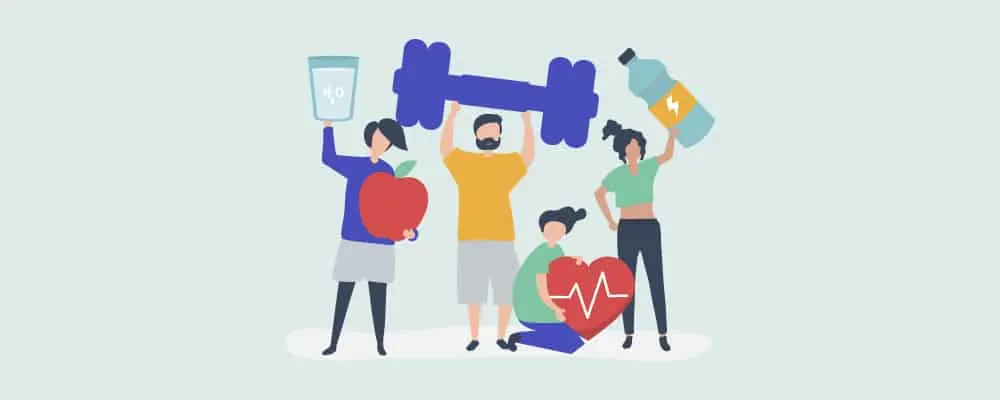
If you need to reduce how many energy drinks you’re consuming, here are some alternative options for beverages that will still help to push you past your mid-afternoon slump.
Water
You know you should be drinking 2 liters of this stuff a day, right? Water is a great alternative if you’re trying to cut down on your energy drink consumption, but it’s also something that you should be drinking anyway!
Seriously though, if you’re feeling overly tired or if you notice a sudden dip in your energy levels, it may be because you’re dehydrated, so pouring a nice, cold glass of water can be a great, hydrating alternative to drinking energy drinks.
Smoothies
Smoothies are both delicious and packed full of nutrients which makes them a tasty alternative to knocking back energy drink after energy drink.
By including ingredients like dark green leafy vegetables (spinach, kale, or parsley, for example), which are an excellent source of B vitamins, you can tailor your smoothie to enhance your energy levels and to promote health in a number of different areas.
Vitamins
If the main appeal of energy drinks is that they add supplements to their formula or recipe, you’d be better off taking actual vitamins.
However, if you’re trying to keep your caffeine consumption low, you can choose an energy drink that is higher in vitamins as an alternative, as these provide a natural source of energy.
Summary
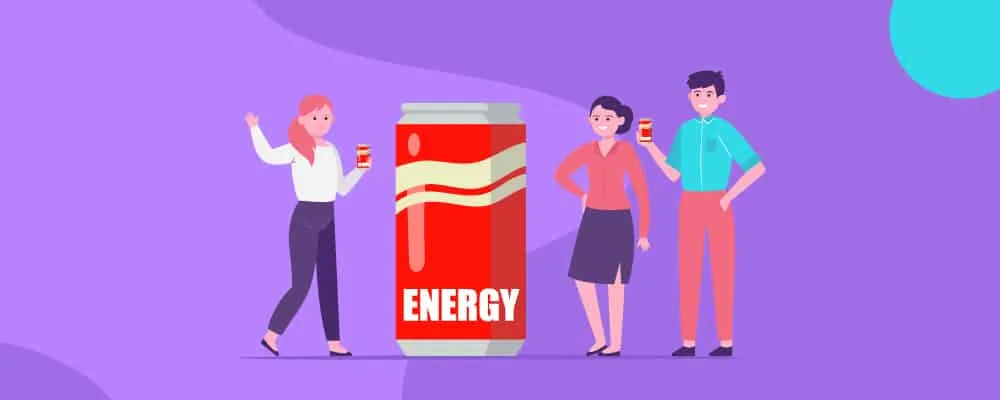
As you can hopefully see after reading this article, there are plenty of benefits to drinking energy drinks, but there are also consequences if you consume too much of these sugary, highly caffeinated beverages.
Provided you consume them in moderation, there’s no reason why you shouldn’t be able to enjoy the occasional energy drink in place of tea or coffee.
Just make sure that if you’re consuming other caffeinated products throughout the day that you don’t exceed the recommended daily maximum limit!
